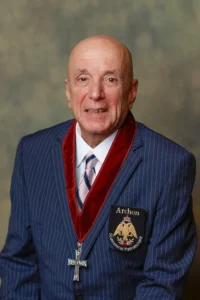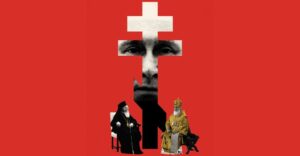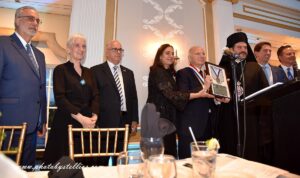List of Predominate Problems Faced by the Ecumenical Patriarchate
The Legal Status of the Ecumenical Patriarchate: The Turkish Authorities have not yet granted a legal personality to the Ecumenical Patriarchate. This deprives the Patriarchate form owning any property, such as its own administrative building, and also contributes to sustain many of its problems.
It is imperative to recognize the Ecumenical Patriarchate as a legal personality of special ecclesiastical law of an international character, not dependent on State Welfare Foundations (Vakif) laws, the ones linked with the control issues of the General Directorate for Foundations. Also it is imperative to recognize the legal personality of the local Holy Metropolises of Chalcedon (its administrative building, an edifice of great value, is under threat), of Derkon, Prince�s Islands, and Imvros and Tenedos.
The Ecumenical Status of the Patriarchate: The Turkish authorities do not accept the Ecumenical status of the Patriarchate. They only recognize the Patriarch as the religious leader of the Greek Orthodox minority in Turkey, thus limiting his status to that of �Chief Priest of the Rum Orthodox� The Turkish authorities also do not allow the Patriarch and the Patriarchate to use the term “Ecumenical” in any religious activity. But this is an ecclesiastical title recognized by the entire world, which was bestowed to the Church of Constantinople in the 6th century. The Turkish State should recognize the ecumenical status of the Patriarchate and allow it to use the title �Ecumenical� as it performs its major spiritual duties and responsibilities according to the ecclesiastical canons of millennia, without any hindrance or unwarranted objections.
The Election of the Ecumenical Patriarch: The election of the Ecumenical Patriarch must take place in accordance with the ecclesiastical law and the Orthodox Church Tradition. Despite its secular character, the Turkish State insists on interfering, in a regular and systematic manner, with the procedure of the election of the Patriarch. This interference is not based on a specific Turkish law but on decrees issued by the Prefecture of Istanbul in 1923 and 1970.
If the presence and continuation of this institution in this country is wished for, the State must officially recall the illegal �Tezkere� of Deputy Prefect of Istanbul of 1923 and the subsequent written order (Talimat) of 1970 by the Prefect of Istanbul, so that any of the bishops of the Ecumenical Patriarchate can be elected as a Patriarch. Afterwards, he should also receive Turkish Citizenship (on this there is a previous decision on the election of Patriarch Athenagoras). If this does not take place, the Ecumenical Patriarchate will be de facto incapacitated to elect a Patriarch, probably even in the near future. Allowing clergy who are at least citizens of member-states of the EU would be acceptable at this time.
The Training of Clergy – The Reopening of the Theological School of Halki: There has been no progress in the re-opening of the Theological School of Halki. This past summer, it has been reported that the Turkish government was working on reopening the school and that it was to reopen this past September. However, there has never been any official communication from the government to the Patriarchate about this issue. The Ministry of Education has not responded to the Patriarch�s suggestion / formula to form a mixed committee with members from both the Ecumenical Patriarchate and the Ministry of Education of Turkey, in order to address and talk in depth about the details of this issue. Should the situation remain unchanged, the Ecumenical Patriarchate will continue to be unable to train properly clergy from its local Orthodox community.
The Granting of Residence and Work Permits to Foreign Clergymen and Employees of the Ecumenical Patriarchate: As is well known, the Greek Orthodox Minority has been largely diminished. Additionally, the non-operation of the Theological School of Halki for the past 33 years has resulted in a major lack of manpower of clerics for the manning of the various offices of the Patriarchate. Since the Ecumenical Patriarchate is not recognized as having any legal status, foreign clergy from its dioceses abroad working at the Patriarchate can not obtain residence or work permits from the Turkish authorities. For this reason, a number of clerics must be invited from Greece to work at the Patriarchate. There are more than 10 clergymen of foreign citizenship (mostly Greek and one American) who work in the Patriarchate today. However, they work �illegally�, as tourists, and therefore must exist and reenter the country every three months to renew their tourist visa. This of course cannot be considered as a solution to this problem.
Work and residence permits must be given to the clerics and others that currently work at the Ecumenical Patriarchate and to those who will be invited to work here in the future.
The Properties and Property Rights of the Ecumenical Patriarchate and the Greek Minority Community and its Pious Foundations: By virtue of the recent legislative changes, the Greek-Orthodox communities have the right to acquire real property. Their juridical acts were also recognized but long-standing practices still remain in force, as no effective solutions have been introduced to solve the problems faced by the Communities and Institutions of the Greek-Orthodox minority. For instance, seized properties remain seized. Moreover, a high percentage from the numerous applications submitted almost one year ago by the Greek-Orthodox communities to the General Directorate of Foundations under the said legislation have been rejected. In some cases, Turkish authorities do not even allow registration in the name of the respective foundations even of the Greek-Orthodox church buildings. As a result of this policy, the number of Greek-Orthodox properties has been diminished dramatically. Therefore, the new law does not remedy the past injustices and contains restrictive provisions, which actually results in the arbitrary dismissal of Greek-Orthodox administrative committees and in the loss of the remaining minority Foundations property. As you know, with an illegal legislation of the Highest Court of Appeals in 1974, our minority has been stripped of all property that was acquired after 1936. Even today, with the new laws of readjustments to the European vested rights, property titles were given only to the properties that were included in the declarations of 1936. It is a well-known fact that hundreds of buildings that had been acquired by our communities and our foundations after 1936 are neither recognized nor accepted as property of our communities.
Seized Properties: The characterization of a property as �seized� of our minority Foundations (until now there are 18 such cases in Istanbul and Imvros), hence �abandoned� and therefore coming under the authority and fruition by the General Directorate of Foundations, must cease. The already seized properties must be returned.
It has to be noted that the already composed new legislation draft on Welfare Foundations does not call for the cancellation of the seizures. From an initial look, it can be seen as quite negative as it includes articles that come contrary to the Patriarchate�s interests, aside from the one on the return of taken minority properties by various means.
The Churches of Galata: The Turkish authorities seized in 1924 and in 1965 four Greek Orthodox Churches of the Ecumenical Patriarchate in Karak�y (Galata) and their property and granted them to the so-called �Turkish-Orthodox Patriarchate�, a schismatic Church with not faithful, not recognized by any Christian church internationally.
The churches of Galata and their property, seized by the heirs of the infamous papa Efthim, must be returned to the Ecumenical Patriarchate, because the so-called �Turkish Orthodox Patriarchate� is de facto non-existent and the sustaining of this issue exposes Turkey to the international community.
The Administration of Greek-Orthodox Community’s Institutions: During the last decades, the Turkish authorities have taken the property from several minority institutions (2 in Imvros, 6 in Istanbul and all the monasteries (approximately 8) in the Prince Islands) and passed the management of these pious foundations to the General Directorate of Foundations, which also appoints the boards of trustees. An additional problem of great concern to us is that, since 1991, the licenses needed for the conduct of elections for the board of trustees of the Greek-Orthodox minority foundations have been denied. Furthermore, three of our foundations, which according to the canons of the Orthodox Church have always been administered by the Ecumenical Patriarch, were put under the administration of laity by the Turkish Authorities. These three foundations are the Patriarchal Church of St. George in Istanbul, the Theological School and the Monastery of the Holy Trinity in Halki (Heybeliada).
The Administration of the Greek-Orthodox Cemeteries: By virtue of Article 160 of the Turkish Law concerning the Municipalities, the administration of the Greek-Orthodox cemeteries has been taken from the Greek-Orthodox community and passed to the local municipalities of Istanbul, despite the provisions of Article 42 of the Treaty of Lausanne. In addition, several times during the last decade, Greek Orthodox cemeteries were vandalized and ruined. One example, among many, is the Orthodox cemetery of the island of Burgazada, still used by the minority community of this Marmara Island, which has been taken over as “property of the state” by the General Director of Waqfs. The Turkish Authorities have taken away the property rights of almost 40 cemeteries from our minority and have given them to the municipalities in which they were located.
Education of the Greek-Orthodox Minority: Current educational policies and practices have severely affected Greek-language minority education in Turkey. As a result of measures adopted in the past by the Turkish authorities the quality of minority education has deteriorated and the number of students shrunk to very low levels. Every year Greek-language minority schools are forced to close down due to the lack of students. To reverse this unfortunate situation urgent measures need to be put in place. Such measures have to address the following restrictions and practices:
- The systematic rejection by the authorities of the requests of the School Directors to fill vacancies.
- Refusal to allow minority teachers to teach in more than one school.
- Restrictions imposed on the enrolment of students.
- Reduction of teaching classes of the Greek language.
– Many minority schools have closed down, but the Turkish Authorities insist considering them as open and active and they have appointed a Turkish vice-principle. They do not allow the usage of the approximately 38 schools for any other reason but educational. Therefore, the school buildings are slowly destroyed, trespassed, and or expropriated by the state, as it happened with the school of Ortak�y of Bosphorus.�
- The systematic rejection by the authorities of the requests of the School Directors to fill vacancies.
- Refusal to allow minority teachers to teach in more than one school.
- Restrictions imposed on the enrolment of students.
- Reduction of classes of the Greek language.
New Taxation of the Greek Minority Hospital of Balulki: The Greek Minority Hospital of Bal�kl� is one of the first hospitals established in Europe almost 250 years ago and is located in one of the most historic areas of the city of Istanbul. It is also considered as the largest Greek community foundation in Istanbul and since the day of its founding this Hospital operates as a non-profit, public welfare minority foundation that offers medical relief to poor people, irrespectively of race or religion and especially to poor Turkish people and members of the Greek Minority. Its functions as a non-profit institution, hence its exclusion from the tax legislation of this country, is safeguarded by Articles 37-45 of the Lausanne Treaty. Furthermore, the Hospital�s records and permission to exercise its functions (issued in 1947) clearly state that this is a non-profit foundation and hence exempt from any taxation related to pious foundations (vak�f).
Following a 1994 issued decision of the Taxation Authority of Zeytinburnu that has not until now been put into force and was never made known to the board of trustees of the foundation, the aforementioned Authority issued a new decision according to which the Greek community hospital of Bal�kl� will be included into the category of �kurum� (�foundations�). This would mean that the foundation under whose name the said hospital operates, for the first time in its existence, will be obliged to pay regular and supplementary foundations� taxes (kurum vergisi) as well as the collected VAT from the exploitation of the foundation�s Hospital. This is retroactive from Fiscal Year 1999 to 2004 and the estimated percentage of annual income taxation has been calculated to no less than 42%.
Furthermore, according to a letter sent by the Directorate for Logistical Affairs of the Istanbul Prefecture to the Committee of Trustees of the Bal�kl� Minority Hospital dated 13-09-2004, stating a circular issued on 29-06-2004 by the General Directorate for Budget and Tax Control of the Ministry of Finance it is stated that �hospitals belonging to pious Foundations (vak�f) first of all are exempt from any foundations taxation, and according to articles of the Tax Legislation, such foundations have no obligation whatsoever to issue receipts for services rendered�. Additionally the Minority Hospital of Bal�kl� is called to sign agreements reported in that same document and come in accordance to the Protocol on �private hospitals�. Lastly, the Taxation Authority of Zeytinburnu has ordered for a group of accountants to investigate the Hospital�s financial records.
Without a doubt, if the already taken decision is indeed put to force, this would lead the Hospital, which is the last great Greek Minority foundation, into bankruptcy as it would have to pay an unknown amount of trillions of Turkish Liras in taxes, an amount of such proportions that this institution is not able to sustain.
This memorandum has been prepared to inform all interested parties on the minorities freedom violation surrounding the illegal, and against the signed Treaty of Lausanne, attempt to add taxation to one of the most esteemed foundations of the Greek Minority of Istanbul. The accomplishment of such an attempt would have severe repercussions on the well being of the 200 people who currently receive free care at the Minority Hospital of Bal�kl�.
Greek Minority on the Islands of Imvros (G�k�eqda) and Tenedos: The resident Greek population on the two islands of the Aegean Imvros (G�k�eada) and Tenedos (Bozcaada) has come to suffer a number of human rights violations since the early 20th century and throughout most of the previous one hundred years. The aforementioned islands, historically settled by Greeks, were granted to the Turkish Republic under the 1923 Treaty of Lausanne, which established a semi-autonomous status aiming at the sustaining of rights and privileges such as the preservation of the national and religious identity of the population (see also article 14 of the Lausanne Treaty).
Regardless of the provisions granted by the Treaty of Lausanne, only 220 out of the 6000 Greeks who resided on the island of Imvros in 1964 are now residents. This fact is seen as a result of the massive exodus that took place from 1964 until 1974. Similarly the population on the island of Tenedos has been significantly reduced from 2500 in the 1960s to just 22 elderly people.
Some of the problems that the minority on these two islands has come to face over the years can be summed up as follows:
- The deprivation of their right to education through the closing of Greek schools, the seizing of school buildings of the Greek communities [such as the minority schools in the villages of Agrides (Tepek�y) and Glyki (Bademlik�y)] and the ejection of Greek teachers.
- The violation of the right to exercise their religious freedom and the preservation�of their cultural identity through the prohibition to exercise Greek Orthodox religious festivities, the confiscation of churches chapels and other properties belonging to Greek Orthodox Foundations, the change of names of both islands, of the villages and of other locations.
- Violation of the right to exercise the economic activities by appropriating almost the sum of the arable land projecting various pretexts, by prohibiting cattle-raising, shipping, and commerce. Recently the prefect of Imvros informed the heads of the Greek Minority on the island that their properties, including the ones registered in the Land Registry, are in the serious danger of being lost due to Law No. 5226/27.7.2004. According to Law No. 5226/27.7.2004 that amends Law No. 2863/21.7.1983 on the �protection of cultural and natural wealth and monuments of Turkey (Sit alan�)� any property ownership can be confirmed only by presenting a title of ownership, whereas no private contract of purchase or usucaption authority is acceptable. Let it be noted that a large number of members of the Greek Minority of Imvros has already received a decision of rejection of their appeals to ratify their titles of deed under the excuse that their properties have been registered as areas of preserved wealth. Furthermore, under article 5 of the said law, Authorities have the right to lay claim on properties that have even been registered after the 27th of July 2004 under the names of the Greek Minority on the Land Registry, which literally subverts any procedures to compose the land registry and to ratify their ownership. The procedures leading to these registrations have cost those members of the Greek Minority huge amounts of money. Furthermore, the Land Registry for the villages of Shinoudi (Derek�y) and Glyki (Bademlik�y) has still not been completed. Article 1 (which amends article 3,a,1 of Law 2863) of the new law defines as �cultural wealth and monuments� all wealth present on the surface, on the underground or undersea, that is mobile or not, and associated with science, culture, religion and fine arts, part of the social life, that belongs to pre-historic or historic periods and has a special value from cultural and scientific point of view. Finally under article 5 the words �preserved buildings and areas� are added after the words �areas under protection� in the second phrase of the first paragraph of article 11 of law 2863.�
- The deprivation of the right to live in a safe environment by the establishment of an open prison on the island of Imvros. As such, prisoners serving their term have been responsible for a number of heinous crimes such as rapes, manslaughter, and stealing. Even though this prison has now been closed, the impact of the events that took place during those days as well as the fact that non of the cases ever reached a courthouse, proves the viciousness of the plan to open a prison such as that on an island such as Imvros.
The European Union has already referred to the issue of the Greek Minority on those islands, in its annual Progress Report of 6 October. However Turkey should make sure that the following take place so as to secure the safety and well being of the remaining populations on those islands:
- The right to education must be granted by a) securing the education of Greek students in their mother tongue and b) re-opening Greek schools on those islands as well as suspending the measure to convert Greek school buildings into private corporation buildings.�
- All prohibitions to exercise Greek Orthodox religious feasts must be invalidated and all churches must be given an appropriate legal personality and all access to these must be granted.�
- Any appropriated land that does not serve to legal purpose of its initial appropriation must be returned to its legal owners.�
- All rights to ownership, including the rights of the heirs of owners, must be consolidated. In the case of Greeks of Imvros this should be done by recognizing them as having equal rights with the rest of the non-Greek population on the island, independent of their ethnicity. It should be noted that most properties belonging to persons or communities of the Greek minority of the islands has been registered under the name of the Turkish public and this due to the reason that the land registry has been drawn up using sketchy and concealed procedures. This drawing up of the Land Registry of the two islands has allowed for the authorities to leave an empty space for the names of owners for a large number of properties and therefore has rendered these properties as viable for use and administration by the Turkish State and the local Authorities. Additionally Turkish Authorities have created five (5) new purely Turkish �villages� by settling populations relocated from Anatolia.
This memorandum has been drawn up to inform all interested parties on the human rights violations against the Greek minority populations on the two islands of Imvros and Tenedos. Violations that have been taking place over a span of more than forty years and are responsible for the current uncomfortable position of the minority on these two islands. It is believed that if the current situation continues this will end the millennia old presence of Greek populations on these two islands.
Status of the Orphanage Building of Prince Island (B�y�kada):The building of the Orphanage of Prinkipos (B�y�kada) is a unique wooden edifice of large historic, architectural and financial value as it is considered that for more than one hundred years is registered property of the Ecumenical Patriarchate. However this, a recent Turkish Supreme Court decision issued on the 11th of October 2004 has ordered that the Orphanage has been validated as belonging to the Ecumenical Patriarchate unlawfully, thus from now on it has to be administered by the Foundations Directorate and therefore is considered as apprehended by the Turkish State.
Specifically, this decision demonstrates that the edifice is property of the board of trustees of the orphanage. The board of trustees was abolished by the Turkish authorities and the estate was characterized in 1997 as seized property (mazbut), and all the properties under the name of the Prinkipos Orphanage, have been appropriated. Since then, these properties are being administered by the General Directorate of Welfare Foundations, which receives rental income, etc.., and therefore the edifice of the Orphanage itself, has come under the direct authority and management of the aforementioned Directorate (and therefore of the Turkish State).
However this, Turkish Authorities have not as yet acknowledged the following historical facts: In the year 1902, after an approval was granted through a Sultan order (firman), the Patriarchate obtained through purchase, a property on the island of Prinkipos (B�y�kada). A relevant registration took place in the respective land registry, and the Ecumenical Patriarchate was given a relevant and valid, until this very day, title of deed in its name. At a later date the Patriarchate transferred only the use of the said property (and not the ownership) to the Board of Trustees of the Orphanage, which was responsible for the care-taking of orphans of the Greek Orthodox Minority. Additionally titles of deed were issued by the Turkish State in 1929 and 1994 and referred to the Ecumenical Patriarchate as owner of the said edifice.
Subsequently, and due to the fact that the largest portion of the Greek Orthodox Minority of our city was forced to immigrate due to the tragic events of the years 1955 and 1964, the operation of the Orphanage was suspended. The suspension was also due to the Turkish authorities� pretext of a danger of fire for the building, and therefore an order to empty it was given and around 200 orphans were relocated to the monasteries of Prinkipos. However, despite the Ecumenical Patriarchate�s repeated petitions from 1963 until this present day, no permit to restore this historical edifice has ever been granted, and the said estate is on the verge of collapse.
In 1997, the Turkish State dictated that the Orphanage was to be seized by the Directorate of Foundations and therefore be administered by the said Directorate. Following this decision, the Directorate of Foundations initiated a legal prosecution against the Patriarchate with a plea to annul its title of deed and registration of property, in order for it to register the estate under the name of the Orphanage itself, and as a result, succeed to appropriate it indirectly. The Supreme Court wrongfully and illegally ignored the valid title of deed that the Ecumenical Patriarchate has in its possession, validated both by the Sultan firman the purchase action and the 1929 and 1994 registrations and grounded its decision on a unilateral and misinterpreted statement of the administration of the Orphanage, that it had no title of deed under its name. The Court considered the existing, for more than one hundred years, registration of the estate in the Land Registry in the name of the Patriarchate, as null and void, but under a pretext that contradicts the enacting part of the judgment and which testifies the difficulties that the Court faced before reaching itself to a decision supported by any meaning of legality.
This memorandum has been drawn up to inform all interested parties on this violation of the right of the Ecumenical Patriarchate to own properties under its name. This violation comes directly in contradiction to both state law, the European Union acquis and signed international treaties such as the Treaty of Lausanne and if it is not brought to a close, will be responsible for the immense destruction of centuries old properties inside and surrounding the city of Istanbul.







